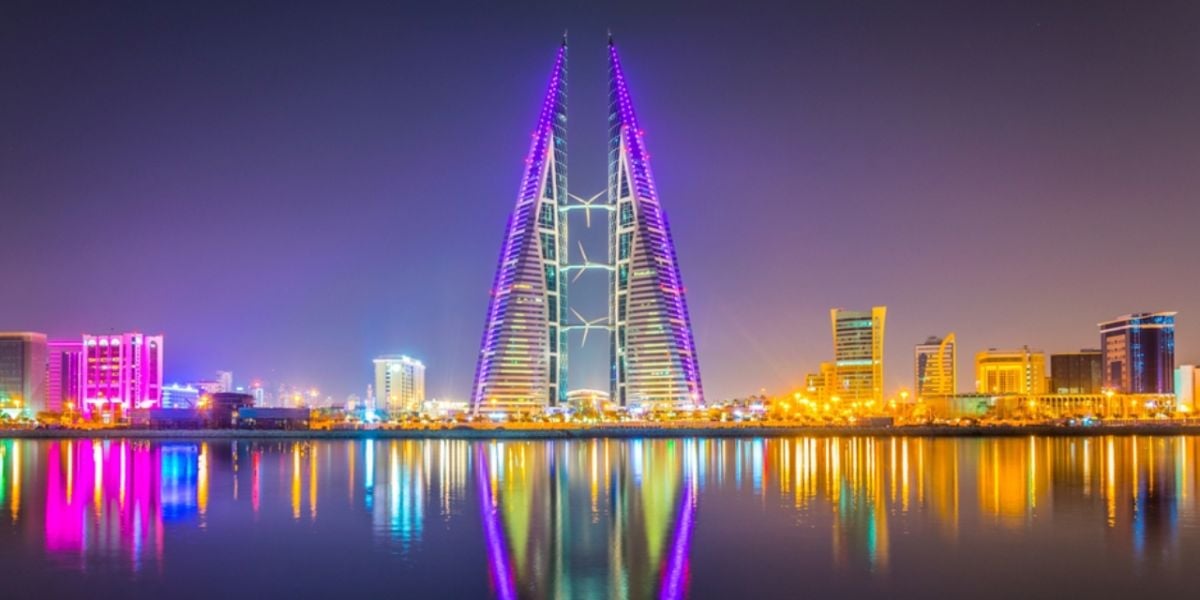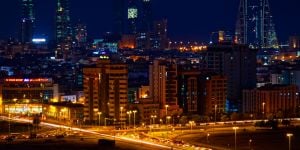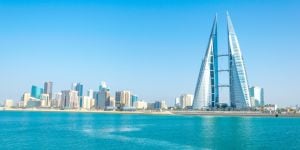
Newcomers will discover that Bahrain is a welcoming and diverse kingdom, enriched by its long history of hosting expatriates. While contemporary influences are visible throughout the country, Bahrain's deep Arabic and Islamic traditions also play a significant role in shaping its cultural landscape. As such, some aspects of life and work in Bahrain might differ from what expatriates are used to, as explained in this guide. However, by approaching these differences with an open mind, a friendly demeanor, and a readiness to embrace new experiences, expatriates can easily adapt to the Bahraini way of life.
Cultural dynamics in Bahrain
Bahrain's culture blends traditional values with modern influences, reflecting its historical role as a major trading hub. This unique mix manifests in its art, music, cuisine, and festivals, making Bahrain an engaging destination for locals and expatriates alike.
A mosaic of cultural influences
As a member of the Gulf Cooperation Council (GCC) with a rich history in trade and cultural exchange, Bahrain is often regarded as a melting pot of diverse traditions. The country has historically been a welcoming hub for traders, entrepreneurs, and workers from around the world, fostering an open-minded and tolerant society. Known for its hospitality, Bahraini locals are generally approachable and friendly, which helps expatriates adapt more easily. Although Islamic customs are prominent, Bahrain is considered more liberal compared to other GCC nations, contributing to a more diverse social atmosphere.
Bahrain's strategic position as a maritime trade center has enriched its culture with a mix of Arab and Islamic traditions, as well as influences from South Asia, Persia, and Africa. This rich cultural tapestry is evident in the country's architecture, culinary scene, language, and social practices.
Traditional attire and modern fashion
In Bahrain, traditional attire is common alongside a significant presence of Western fashion. While some men opt for dishdashas and some women choose abayas in public settings, Western-style clothing is also widely worn by both locals and expatriates. Despite this diversity, dressing modestly in public is recommended, especially when visiting religious or governmental sites. For casual and formal occasions, many locals wear Western attire, but it's common for men to wear traditional thobes at formal events, and women often select kaftans (jallabiya) for traditional festive occasions. This blend of clothing styles reflects Bahrain's balance between tradition and modernity.
Social etiquette
Familiarity with Bahraini customs is essential for anyone planning to live in the Kingdom in the long term. For instance, when visiting a Bahraini home, it is customary to bring a small gift, such as sweets, flowers, or a fruit basket, as a gesture of appreciation. Upon entering a home, guests are typically expected to remove their shoes at the door; it is advisable to ask before entering a home and make sure it is acceptable to enter with shoes on.
Social interactions in Bahrain rely heavily on personal relationships. Establishing trust and rapport is critical, both socially and professionally. For expatriates, demonstrating patience and adaptability is key to building meaningful relationships in Bahrain.
Religion in Bahrain
Islam is the predominant religion in Bahrain, with the majority of the population being Muslim. However, Bahrain is also home to a variety of other religious communities, including Christians, Hindus, Buddhists, and others, making it one of the more religiously diverse countries in the region. This diversity has cultivated a sense of mutual respect among different religious communities. Bahraini Muslims celebrate religious holidays and traditions, often involving people from various backgrounds, enhancing the country's sense of community.
Ramadan in Bahrain
Ramadan, the holy month of fasting, is a significant time in Bahrain. The entire country shifts to accommodate the customs of this sacred month. While expatriates are not expected to fast, they should be mindful of those who are by avoiding eating or drinking in public during daylight hours. Special prayers, known as Taraweeh, are held in mosques each evening, and the streets are often lively during the hours following Iftar, the meal that breaks the fast.
Gergaoon
One of the most beloved traditions during Ramadan is Gergaoon, observed on the 14th night of the month. It is a joyful event, especially for children, who dress up in colorful traditional outfits and visit homes in their neighborhoods, singing a distinctive song while asking for treats. In response, neighbors fill the fabric bags carried by the children with a mix of nuts, candies, and other snacks. The custom is similar to trick-or-treating and emphasizes unity, sharing, and community spirit—central aspects of Bahraini culture. Gergaoon is a lively expression of hospitality, bringing neighbors together to celebrate Ramadan's spirit of generosity.
Ghabga
Ghabga nights are another distinct tradition during Ramadan. These social gatherings occur after Iftar and extend until Suhoor, the pre-dawn meal before the next day's fast begins. Ghabga events often see attendees dressed in traditional attire—men in thobes and ghutras, and women in stylish kaftans. Participants enjoy a variety of light meals, desserts, and traditional tea or coffee while engaging in conversations or playing traditional games. Many hotels and restaurants host special Ghabga tents, where guests can experience a change of scenery. These tents offer live music, shisha (hookah), and a buffet-style Suhoor, making Ghabga nights an anticipated social event during Ramadan.
Business culture in Bahrain
Bahrain's business environment is characterized by a combination of traditional practices and modern corporate strategies. For expatriates aiming to succeed professionally in Bahrain, understanding local business etiquette is crucial.
Building business relationships
Personal relationships are essential for successful business interactions in Bahrain. Business meetings often begin with casual conversation, and initial discussions may not result in immediate decisions. Refreshments, such as Arabic coffee (qahwa) and dates, are typically offered during some meetings, and it is considered impolite to refuse them. Business negotiations may involve social elements, such as shared meals, which help establish and strengthen professional relationships.
Language in business settings
While Arabic is the official language in Bahrain, English is widely used in business settings. Most expatriates do not need to be fluent in Arabic to conduct business, but learning a few basic Arabic phrases is often appreciated by locals and can contribute to building rapport.
Gender equality in the workplace
Bahrain's workplace culture emphasizes gender equality, with women holding prominent roles in various sectors. The Kingdom has made strides in promoting women's participation in both public and private sectors, and women often occupy leadership positions. However, modesty in professional attire is expected regardless of the temperature, with both men and women adhering to conservative dress codes.
Dining and cuisine in Bahrain
Bahrain's culinary scene is as diverse as its population, offering a range of traditional Bahraini dishes alongside international cuisines. The country's food culture is a vital part of its social fabric, often reflecting its rich heritage.
Traditional Bahraini cuisine
Bahraini cuisine is characterized by a blend of spices and flavors influenced by Arabic, Persian, Indian, and African culinary traditions.
Breakfast: Traditional breakfast dishes include balaleet, a sweet vermicelli dish often served with an omelet, and khubz (local flatbread) paired with cheese or mahyawa (a tangy fish sauce). Expatriates can also enjoy international breakfast options like omelets and pastries, which are widely available in cafés and restaurants.
Lunch: Lunch is typically the main meal of the day. Popular dishes include Machboos, a spiced rice dish with chicken, lamb, or fish, and Biryani, which layers rice with marinated meats and spices. Local seafood, like safi (rabbit fish), is also a staple.
Dinner: Evenings are often reserved for lighter meals, with a mix of Bahraini and international dishes enjoyed by families. For dessert, halwa—a sweet treat made from sugar, rosewater, and nuts—and luqaimat, sweet fried dough balls, are popular choices.
Street food and international cuisines
Street food is widely enjoyed in Bahrain, with popular options including samboosa (savory pastries), shawarma (meat wraps), and grilled kebabs. International dining is well-represented, with Indian, Chinese, Italian, and American restaurants found throughout the country. Notable fine dining spots include Fusions by Tala, known for its creative blend of Asian and international flavors, and Cut by Wolfgang Puck known for its premium meats, steaks, and wines, and many cafés like Lilou Café, famous for its pastries and elegant ambiance.
Social life and nightlife in Bahrain
Expatriates will find that Bahrain has a vibrant social scene. The Adliya district is a popular nightlife hub, with various bars, lounges, and clubs catering to diverse tastes.
Bars and lounges
Bahrain's nightlife is centered around the Adliya and Juffair areas, offering a range of venues from laid-back pubs to upscale lounges. Popular bars include JJ's, known for its lively atmosphere, and Haus, a trendy spot with regular DJ nights.
Clubs and parties
For those who enjoy dancing, clubs like Orla and Escobar offer vibrant atmospheres with live DJs.
Speakeasies
The recent trend of speakeasies has also reached Bahrain, like Spin and Cotton Gin, providing unique, exclusive experiences for night owls.
Cultural experiences in Bahrain
Bahrain's rich history and diverse culture offer numerous opportunities for exploration and learning, making it an engaging destination for expatriates.
Historic sites
Bahrain boasts several historical sites that showcase its past and cultural significance:
- Muharraq Historic City: Featuring traditional architecture and beautifully restored houses, this area offers insight into Bahrain's history.
- Bab Al Bahrain: An iconic gateway to the capital, originally built in the 1940s, now housing a bustling marketplace.
- Tree of Life: A solitary tree in the desert, believed to be over 400 years old, symbolizing resilience in Bahrain's harsh climate.
- The Pearling Path: A UNESCO World Heritage Site that illustrates Bahrain's pearling history, featuring traditional houses and museums.
- A'ali Burial Mounds: Dating back to the Dilmun civilization, these ancient mounds provide a glimpse into Bahrain's archaeological heritage.
- Al Fateh Mosque: One of the largest mosques in the world, accommodating over 7,000 worshippers and open to visitors interested in Islamic culture.
- Bait Al Quran: An Islamic museum dedicated to preserving copies of the Quran and artifacts related to Islamic art and culture.
Festivals and events
Bahrain's cultural calendar is filled with events that celebrate its rich heritage:
- Spring of Culture: An annual festival featuring music, dance, and visual arts from local and international artists.
- Bahrain Summer Festival: A lively event with performances, workshops, and family-friendly activities.
- Bahrain Music Festival: Showcasing a variety of musical genres, this festival promotes cultural appreciation.
- The Nest in Adliya: A winter festival featuring local artisans, food, and crafts in a festive atmosphere.
- Ramadan Festivals: During Ramadan, cultural exhibitions, nightly prayers, and community iftars bring people together to observe the holy month.
Expat life in Bahrain
Bahrain has a significant expatriate population, fostering a multicultural environment where expatriates can find social networks, support groups, and recreational activities.
Joining an expat club is one of the best ways for newcomers to connect with others. Popular clubs in Bahrain include:
- The British Club: Established over 80 years ago, the British Club is the first expatriate institution and a cornerstone of Bahrain's expatriate community. It offers many amenities, including a swimming pool, squash courts, and multiple restaurants serving international cuisine. The club is known for its vibrant social calendar, which features everything from pub quizzes to gala dinners and themed events. It remains a popular choice for families and individuals seeking a welcoming and inclusive atmosphere. Membership fees range from BHD 50 to BHD 150 annually (approximately USD 133 to USD 398), depending on the package chosen.
- Bahrain Rugby Club: More than just a sports venue, the Bahrain Rugby Club is a vibrant community hub that offers rugby training, social events, and access to other sports such as cricket and netball. Its family-friendly environment includes dining options, children's play areas, and regular events such as live music and themed evenings, making it a favorite among expatriates. Membership fees typically range between BHD 30 to BHD 80 annually (approximately USD 80 to USD 212), depending on the membership type.
- Dilmun Club: Known for its relaxed atmosphere, it is a social and sports club catering to families and individuals alike. Facilities include a swimming pool, tennis courts, and a variety of dining options. Regular activities like quiz nights, yoga classes, and live performances create a lively social calendar for members to enjoy. Membership fees for the Dilmun Club are in the range of BHD 40 to BHD 100 annually (around USD 106 to USD 265), making it an accessible option for individuals and families alike.
- South Asian Expat Clubs: These clubs play a pivotal role in preserving cultural traditions while fostering community spirit. They frequently organize cricket tournaments, festive celebrations like Diwali and Eid, and other cultural events. These gatherings provide members with an opportunity to bond over shared customs and cuisines. Membership fees vary widely, but they are generally affordable, starting from BHD 10 to BHD 50 annually (approximately USD 27 to USD 133), depending on the activities offered.
- Filipino Expat Club: This club is a welcoming space for the Filipino community in Bahrain. It hosts events such as traditional fiestas, basketball leagues, and karaoke nights, offering members a sense of home away from home. The club also provides support networks for new arrivals, including guidance on settling into Bahrain. Membership fees are typically in the range of BHD 15 to BHD 40 annually (about USD 40 to USD 106), making it an inclusive and cost-effective option for those looking to stay connected with their roots.
Membership fees vary but generally offer excellent value for the networking, cultural exchange, and recreational opportunities they provide. These clubs are a cornerstone of Bahrain's expatriate community, fostering a sense of belonging and offering newcomers a chance to build lasting connections.
Outdoor activities in Bahrain
Bahrain's warm climate is ideal for a range of outdoor activities.
Parks and beaches
Al Areen Wildlife Park: A sanctuary for native animals, offering nature trails and family-friendly outings.
Zallaq Beach: Known for water sports like jet skiing and windsurfing, with facilities for picnicking.
Busaiteen Beach: Offers a relaxed atmosphere with beautiful sunset views.
Water sports and adventure
Bahrain's coastline supports diving, kite surfing, wakeboarding, and fishing. Diving enthusiasts can explore sites like the Bahrain Pearl Diving Sites and the Sunken Oil Rig, while kite surfing is popular along Al Khalifa Beach.
Shopping in Bahrain
Bahrain's shopping scene offers everything from modern malls to traditional souks. Both large and small malls are spread out all over Bahrain. Strip malls are also available in pretty much every area of the county, offering a variety of easily accessible options for shoppers.
Bahrain City Centre, for example, is one of the largest malls, featuring international brands and entertainment options like an indoor water park.
Seef Mall is another popular shopping destination with a cinema and a variety of retail outlets.
Souks are an inseparable part of the Bahraini culture. These are vibrant and full of life, with diverse arrays of shops that sell everything, from colorful fabrics to colorful spices to souvenirs and even natural traditional herbal medicine and skin and body care.
Manama Souq is a bustling marketplace with spices, textiles, and handicrafts. Muharraq Souq is known for its Bahraini goods and local artisanship.
Useful links:
Bahrain Expat Clubs and Society Clubs
7 Best Social Clubs in Bahrain
We do our best to provide accurate and up to date information. However, if you have noticed any inaccuracies in this article, please let us know in the comments section below.








